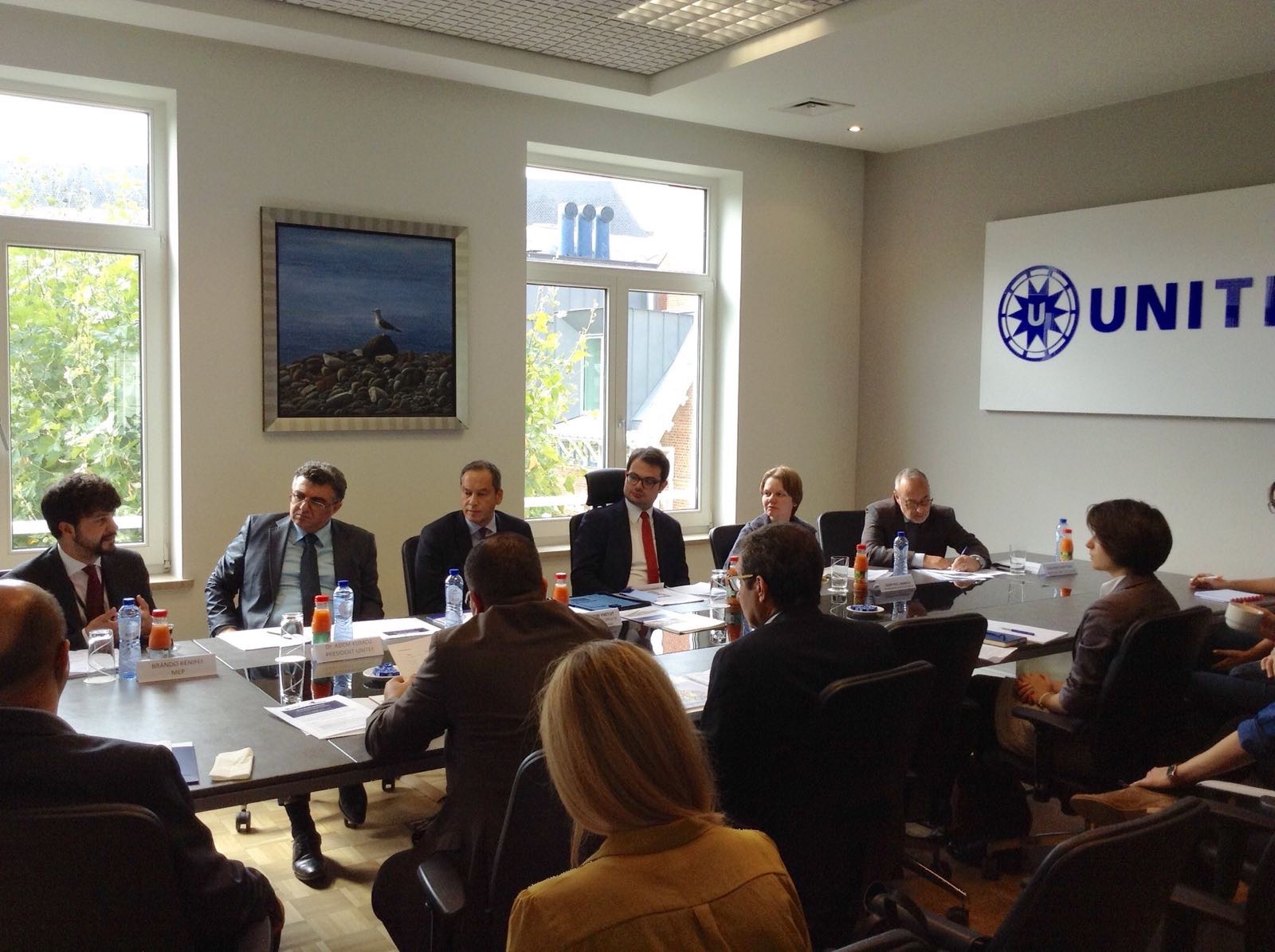
On Wednesday 27th September, UNITEE – The New European Business Confederation hosted the high-level roundtable “Building bridges: the role of New European Entrepreneurs in the European Neighborhood policy“. The roundtable was organised as part of the constant work of UNITEE to contribute to establish a positive narrative of migration. In this regard the topic chosen, at the crossroads between economy, migration and development, is of a particular interest in the framework of the currently discussed European Economic Diplomacy Strategy, together with its wider efforts to stabilize its neighborhood.
The event, set in the intimate setting of UNITEE’s office in Place du Luxembourg 2, 1050 Ixelles, took place from 12.30 to 14.30. It was an opportunity for policy makers, practitioners and experts to debate on the important role migrant entrepreneurs can have in contributing to the political strategies of the EU in the relations with its neighborhood, if given the chance. The speakers were called to reflect on questions such as: Is there really a positive effect of New European entrepreneurs on their country of origin? How could the European Neighbourhood Policy take advantage from the engagement of New European entrepreneurs in order to pursue its long-term objectives of stabilisation and economic growth?
The roundtable started with an opening remark by MEP Brando Benifei, from the S&D group. Mr Benifei drew on his experience as Rapporteur for the labour market integration of refugees to remark the important contributions New European entrepreneurs give to the European economy and society; he pointed out that in some countries, such as his native Italy, from 2011 to 2015 migrants have been disproportionately creating jobs and companies. For this reason, Mr Benifei argued that this contribution needs to be acknowledged and fostered by national and European institutions: he called for unnecessary burdens to be scrapped, together with suggesting the possibility of using the Blue Card directive to help entrepreneurs from abroad to launch their business in the EU.
After Mr Benifei’s introduction, the roundtable started with an intervention by Christophe Yvetot, the Director of UNIDO‘s Brussels Office. Mr Yvetot presented the role of his organisation in focussing on industrial development, with the objective of bringing about sustainable development, circular economy, and renewable energies in developing countries. He pointed out that the strategy behind these actions is connected to migration, since it aims to stabilise people in their countries of origin: indeed, data showed that industrial development had an unparalleled role in reducing poverty. In this, he mde a specific reference to the European Neighborhood Policy (ENP), showing how UNIDO is collaborating with the EU to develop the Euro-Med industrial cooperation. Finally, he explained the two parts of UNIDO’s approach to migration: first, to provide opportunities; and secondly, to bring about circular migration.
After Mr Yvetot, it was the turn of Geertrui Lanneau, Senior Senior Regional Specialist on Labour Mobility and Human Development for the IOM Regional Office for the EU to present her remarks. Ms Lanneau began her remarks by noting the great entrepreneurial drive of migrants: 25% of all entrepreneurs in the UK, for instance, have a migrant background. This is part of a wider set of contributions diasporas have, both in Europe and in their countries of origin: first of all, they bring development and wealth to their countries of origin, through remittances. Secondly, they also contribute socially: in Europe, they create jobs; in their countries of origin, they bring skills and know-how. Nevertheless, Mrs Lanneau noted that this second contribution is somewhat limited by the fact that even many New European entrepreneurs find it hard to invest into their countries of origin, due to corruption and red tape. Finally, she mentioned the relevant role female entrepreneurship can play, and the need to support it through projects such as IOM’s MIDA program.
The next speaker was Giacomo Mattinò, Head of Unit Enterprise Network and Internationalisation of SMEs, DG GROW, at the European Commission. Mr Mattinò focussed his intervention on the tools DG GROW provides for the internationalisation of SMEs and, in general, to create an environment conducive to entrepreneurship in the EU. In general, the European Commission does not distinguish among entrepreneurs: all can apply. First of all, he referred to the Enterprise Europe Network, that aims at supporting SMEs in their ventures abroad: this is made even more necessary by the fact that 90% of European SMEs export beyond their borders. Another tool to foster entrepreneurship is the Erasmus for Young Entrepreneurs, that provides the possibility for aspiring entrepreneurs to spend some time abroad in order to learn a business.
Finally, the roundtable was closed by Adem Kumcu, President of UNITEE. In his remarks, Mr Kumcu drew on his personal experience to provide an overview of the activities, and challenges, of organising migrant entrepreneurs and advocating for them at the European level. He noted that the correct engagement of migrant entrepreneurs is strategic for the EU: only by easily integrating and making the best use out of the diversity of New Europeans, will Europe be able to meet today’s challenges, ranging from an aging society to an increasingly competitive economy. Dr Kumcu also presented some initiatives undertaken in the past by UNITEE with the aim of favouring this engagement, such as its cooperation with the Union pour la Méditerranée and its partnership with UEAPME.
In general, the event showed the many different aspects in which New European entrepreneurs have an important, and currently undervalued, role to play in the relationship of the EU with its wider neighborhood. In the current situation where a successful and long-term integration strategy is more and more important, acknowledging the opportunities migrant entrepreneurs hold is a first step for a more sustainable future for Europe.
Programme of the event
When: 12.30 – 14.30
Where: Place du Luxembourg 2, 1050 Ixelles
12.30-12:50: Welcoming of participants and light lunch
12:50-13:00: Opening Remarks by Brando Benifei MEP (S&D, Italy)
13:00-14:10: Roundtable with the following speakers:
- Christophe Yvetot, Head of UNIDO’s Office to the European Union
- Giacomo Mattinò, Head of Unit Enterprise Network and Internationalisation of SMEs, DG GROW, European Commission
- Geertrui Lanneau, Senior Regional Specialist on Labour Mobility and Human Development for the IOM Regional Office for the EU, Norway and Switzerland.
- Dr. Adem Kumcu, President of UNITEE
Moderated by Giovanni Collot, Editor of The New European magazine
14:10-14:30: Q&A with the audience
More information on the roundtable can be found on Twitter, under #buildingbridges.


